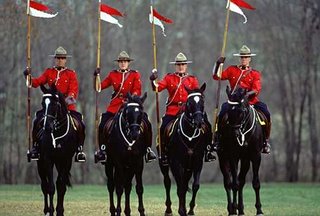 In order to get votes in Quebec, the governing Tory party has made a gesture that will satisfy only seccesionists and nationalists, by putting forrward a parliamentary motion that the Quebecois form a nation within Canada.
In order to get votes in Quebec, the governing Tory party has made a gesture that will satisfy only seccesionists and nationalists, by putting forrward a parliamentary motion that the Quebecois form a nation within Canada.Nationalism has a long history, and it has rarely been a good one; pandering to nationalists is a bad idea.
Quebec is not a nation, for several reasons - chief among them the fact that Quebec is instead a province of a federation.
It was founded by the English and the French, after being violently removed from its indigenous first peoples. The land now called Quebec is not by some kind of mystical union strictly identical to the aspirations of its "Quebecois" (that is French-speaking) people. Quebec belongs equally to its native and multicultural inhabitants, including the large Anglophone minority, none of whom wishes to see Quebec as a separate nation outside of Canada.
Canada has but one nation, which is Canada. It is subdivided into various provinces, which each have different, compelling histories and cultural experiences. Either all provinces are equal under the law, and each beholden to the federal system, or not. Saluting amporphous and emotionally-designated nations within provinces is disruptive and against the multicultural fabric of the larger nation of Canada itself, already a bilingual system that fully answers to Quebec's needs.
Comments